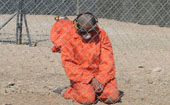Something of an aesthetic hybrid between an impassioned cinéma vérité and the bracing docu-fiction of Peter Watkins, Road to Guantanamo is a provocative, confrontational, and impeccably crafted, if oddly sterile and incongruously stylized re-enactment of the plight of the Tipton Three, a group of working class, British Muslim young men on holiday from the West Midlands who, having traveled from the U.K. to Pakistan and Afghanistan on October, 2001 for an impending wedding and a cross-country road trip to their ancestral homeland, found themselves caught in the crossfire during the outbreak of the war in Afghanistan to root out Osama bin Laden and dismantle the Taliban power structure that harbored him. Inadvertently detained in Afghanistan due to illness, the friends soon found themselves hopelessly strayed from the popular big city destinations, staying instead at a rural border village to recuperate during the untimely start of the military incursion into Afghanistan as the Allied Forces launched a large scale campaign to round up potential Taliban partisans and Al-Qaeda militants for transportation to the covert, extraterritorial detention facilities of Guantanamo on the southern tip of Cuba for intelligence gathering. Forced to evacuate when the village is subjected to heavy bombardment by advancing Allied troops, the friends, along with the displaced villagers, are unwittingly deposited along a stretch of open field for safety, and into the waiting hands of the Northern Alliance where the seemingly suspect coincidence of the young men’s ethnicity, religion, age, citizenship, and circumstance singles them out as fitting the characteristic profile of radical extremists recruited by Al-Qaeda, and sends them on a brutal and unimaginably harrowing course to the limbo of indefinite Guantanamo detention as they are skirted away without trial for further deprogramming and interrogation. Interweaving archival footage, testimonial transcripts, and re-enactments of the young men’s nightmarish plight, filmmakers Michael Winterbottom and Mat Whitecross explore similar issues of civil rights abuses, racial profiling, and political exploitation as Alison Maclean and Tobias Perse’s sobering, incisive, and excoriating documentary Persons of Interest on the U.S. government’s systematic human rights violation and flagrant disregard for the rubric of the Geneva Convention that calls for the civilized treatment of suspected enemy combatants in the wake of an amorphous, post 9/11 “war on terror” global witch hunt, and where the judicial principle of “innocent until proven guilty” has been repeatedly flouted and undermined by the government in its spectral evocation – and apocalyptic, false immediacy – of a looming, undefined security threat. Inevitably, it is the testimonies of the Tipton Three – and not the desensitizing, hyperstylized images of re-enacted, interminable (and often transgressive) brutality – that lucidly articulate the film’s unabashedly critical and impassioned denouncement of the U.S. government’s culture of systematic arrogance of power in its unconscionable rationalization of indefinite detention, torture, and inhumane interrogation as legitimate weapons in the waging of a delusive, interminable, and self-perpetuating terror war.
© Acquarello 2006. All rights reserved.
